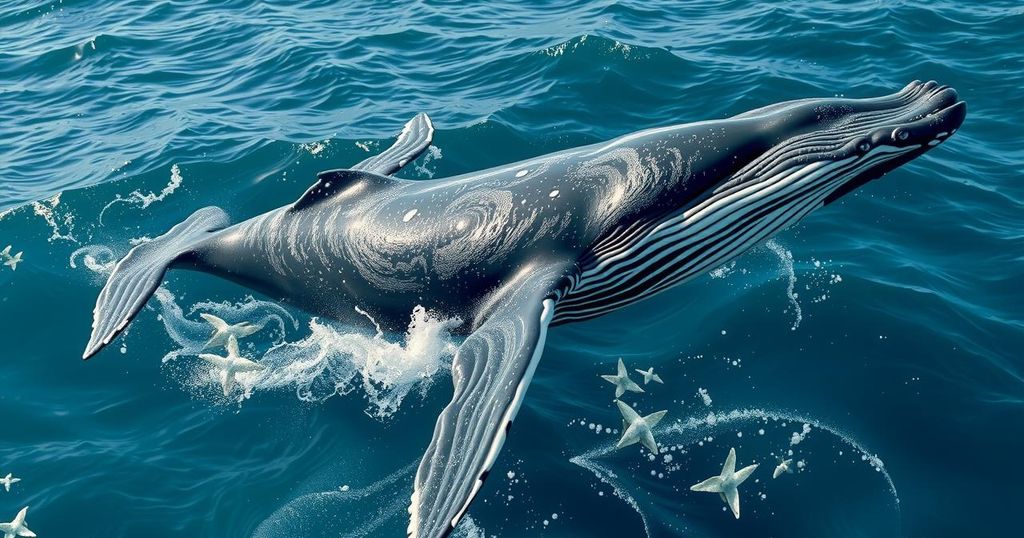A male humpback whale has completed a record migration of over 8,000 miles, suggesting responses to climate change impacting its feeding grounds. First observed off Colombia in 2017, it was later spotted near Zanzibar in 2022. Experts highlight that the whale’s journey may illustrate broader shifts in marine ecosystems due to warming oceans affecting krill availability and prompting these animals to adapt their migratory routes.
A male humpback whale has achieved a remarkable milestone by completing a migration that spans over 8,000 miles (approximately 13,000 kilometers). Initially observed in Colombian waters in 2017, the whale was later documented near Zanzibar in the Indian Ocean in 2022. This unprecedented journey sets a new record and raises important questions about the effects of climate change on marine life. As marine ecosystems evolve, the whale’s migration appears to be a response to altered feeding grounds caused by rising ocean temperatures, leading to significant implications for the species’ future.
Experts, including Ekaterina Kalashnikova from the Tanzanian Cetacean Program, express their astonishment at this unusual behavior, which could be a reaction to shifting food availability primarily linked to krill populations. As krill, a key food source for humpback whales, decreases in abundance due to environmental changes, this migration may signify their search for alternative feeding grounds. Changes in migratory patterns could also reflect broader trends across marine ecosystems as species adapt to increasingly volatile conditions.
Additionally, potential drivers of this migration include the competition for resources among whales and a changing climate affecting traditional breeding and feeding grounds. The impact of climate change on migratory patterns is evident as humpback whales, known for their extensive annual migrations, are forced to alter their routes significantly to maintain access to critical nutrients in the ocean.
As Dr. Kalashnikova articulates, the reasons behind this migration are complex. “The exact reasons remain unclear, but among the possible factors are global changes in climate, extreme environmental events (which are becoming more frequent), and evolutionary mechanisms specific to the species.” This indicates a potential multifaceted response to a rapidly changing marine environment wherein these majestic creatures find themselves increasingly pressured to adapt.
Humpback whales are known for their extensive and seasonal migrations between warm breeding waters and cooler feeding grounds. These movements are crucial for their feeding, breeding, and overall survival. Recent studies has shown how climate change, specifically rising ocean temperatures, directly impacts marine food sources, such as krill, that whales depend on. As these variables evolve, the migratory patterns of humpback whales may serve as indicators of broader environmental changes occurring in marine ecosystems.
The remarkable migration of the humpback whale underscores the substantial impacts of climate change on marine life. With the journey spanning over 8,000 miles, this record-breaking event serves as a reminder of the shifting dynamics within ocean ecosystems. Experts suggest that alterations in feeding patterns, driven by rising temperatures and diminishing food supplies, mark a critical response to environmental stressors. As marine species adapt to these changes, they may reveal significant insights into the health of our oceans, warranting further study and attention.
Original Source: dailygalaxy.com






